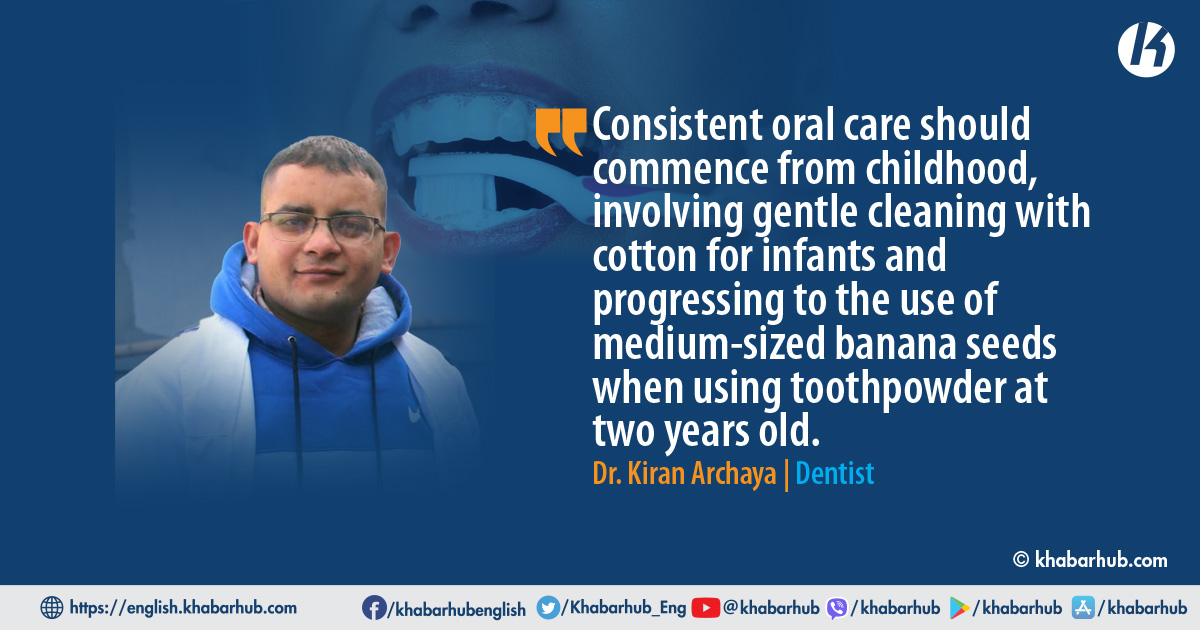0%

Teeth, the resilient structures in the human mouth, serve dual purpose of aiding in chewing and contributing to clear speech.
Recognizing the pivotal role they play in overall health, it is crucial to understand the significance of proper oral care.
In a conversation with dentist Dr. Kiran Archaya, Khabarhub delves into the intricacies of teeth maintenance and the repercussions of neglect. Excerpts:
What causes gum issues?
Teeth, serving as the frontline defenders against daily wear and tear, are often susceptible to the harmful effects of habits such as tobacco and betel nut consumption.
Accumulated debris on teeth, coupled with inadequate oral hygiene practices, can lead to severe consequences for the gums.
The first sign of trouble is often bleeding while brushing, indicating the onset of gum disease.
Neglecting timely treatment allows the condition to progress, eventually leading to weakened gums and the potential loss of teeth.
Contrary to popular belief, proper cleaning, including regular visits to the dentist for scaling, is paramount to maintaining optimal oral health.
What are the consequences of neglecting dental care?
Neglecting dental care extends beyond oral discomfort.
In Nepal, where quick fixes for toothaches are prevalent, the repercussions of self-medication can manifest in various bodily ailments.
Unclean teeth and mouths compromise the nutritional benefits of consumed food, contributing to issues like bad breath, stomach problems, gastric complications, swollen gums, and premature tooth loss.
Why do gums bleed during tooth brushing and how can one care for healthy gums?
The occurrence of bleeding gums during brushing is often linked to the accumulation of dirt in the mouth, leading to issues like bad breath.
The frequency of eating, often up to four or five times a day, may not align with the recommended tooth-cleaning regimen, resulting in debris buildup between teeth and gums.
Approximately 95 percent of gum bleeding incidents happen during activities such as speaking, mouth touching, brushing, or other routine actions, while the remaining 5 percent can be attributed to broader systemic issues.
To care for healthy gums, choosing the right toothbrush, massaging the gums during brushing, and maintaining a proper oral care routine are essential.
What are the key steps to maintaining proper oral care for healthy teeth?
Choosing the right toothbrush is the first step in effective oral care.
Opting for a soft-bristle brush is recommended, as it facilitates gentle cleaning of gums and teeth, effectively removing debris lodged between teeth.
Massaging the gums during brushing is essential, and it is advisable to brush twice a day—morning, post-meal, and evening before bedtime.
A two-hour gap after brushing before eating is ideal, with an immediate rinse after consuming sticky foods.
What causes gum problems, and what foods and habits should be avoided to prevent them?
While fibrous foods contribute to teeth cleaning, sticky and greasy foods, if not adequately cleaned or rinsed, can lead to bleeding gums.
Proper post-meal cleaning mitigates this risk. Regular attention to oral hygiene, including routine dental check-ups every six months, is essential.
Food residues in teeth generate acid, eroding the enamel and causing infections.
The use of a soft brush for comprehensive teeth and gum care is imperative.
What are the preventive measures for maintaining healthy teeth and gums?
Maintaining a clean mouth extends beyond teeth and gums to include areas above the lips and cheeks.
Avoiding betel nut, betel leaf, and gutka is crucial, as is refraining from excessive consumption of cold drinks.
Consistent oral care should commence from childhood, involving gentle cleaning with cotton for infants and progressing to the use of medium-sized banana seeds when using toothpowder at two years old.
Cleaning the tongue is equally vital. Steering clear of junk food, tobacco, and alcohol, coupled with monthly dental check-ups, completes the comprehensive strategy for maintaining optimal oral health.